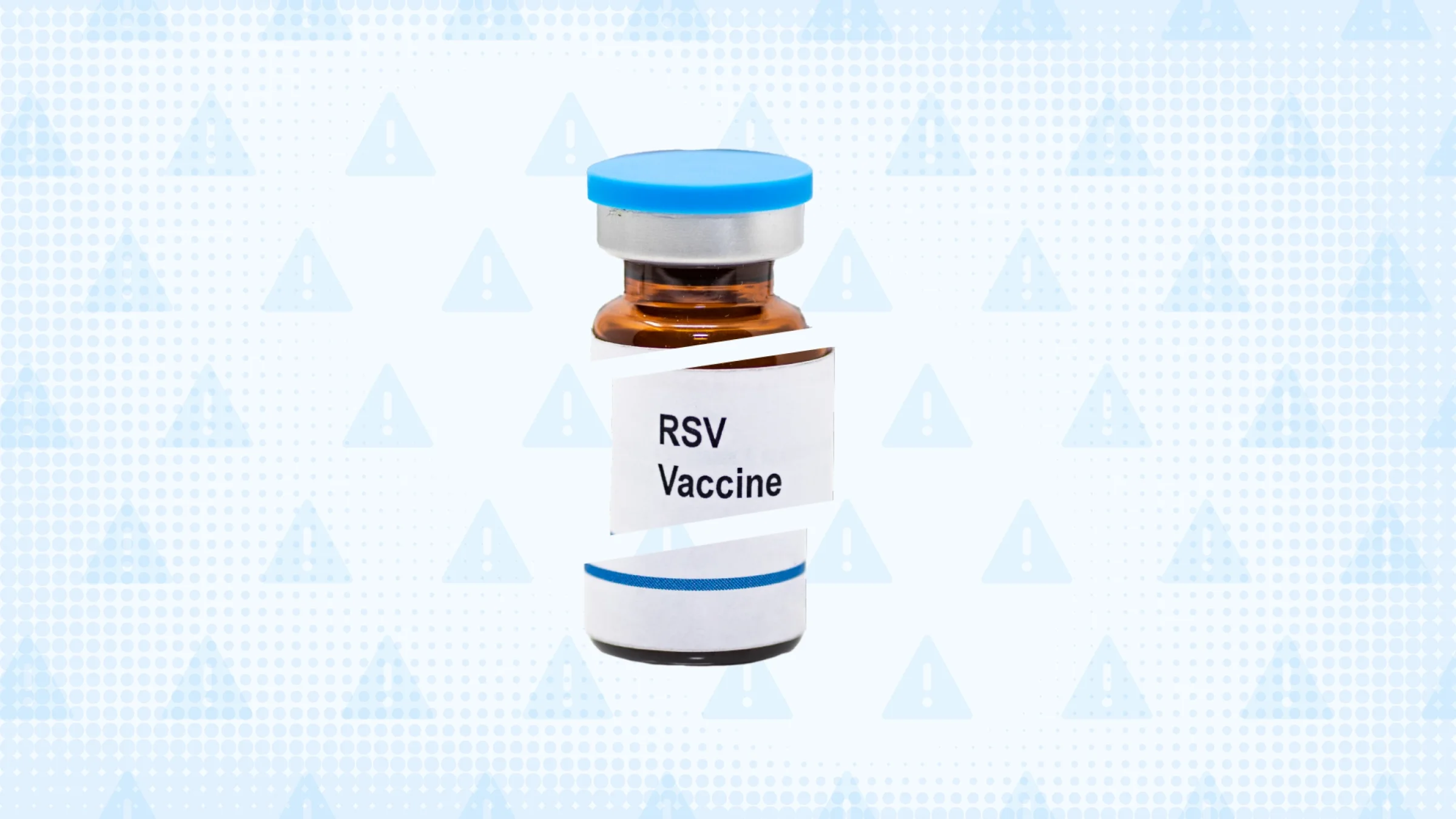Key takeaways:
Arexvy, Abrysvo, and mRESVIA are three respiratory syncytial virus (RSV) vaccines available for older adults. Abrysvo is also approved for pregnant women to help protect their babies after birth.
Common RSV vaccine side effects include injection-site reactions, fatigue, and headache. They are typically mild and can be managed at home until they resolve, usually within a few days.
Reports of serious side effects after vaccination are rare. Examples include Guillain-Barré syndrome and an abnormal heart rhythm. But it’s not clear if they were caused by the vaccine.
Each year, respiratory syncytial virus (RSV) leads to outpatient visits, hospitalizations, and death in young children and older adults across the U.S. Fortunately, three RSV vaccines can help protect vulnerable groups heading into the fall: Abrysvo, Arexvy, and mRESVIA. All three are approved for older adults. But Abrysvo can be given to pregnant women to protect newborns after birth.
Abrysvo, Arexvy, and mRESVIA aren’t live vaccines. So it’s not possible to get infected with RSV after you receive your dose. But it’s normal to feel under the weather for a few days afterward. Headache, fatigue, and soreness at the injection site are a few examples of common side effects.
So what other side effects are possible after receiving Abrysvo, Arexvy, or mRESVIA?
Search and compare options
RSV vaccine side effects at a glance
RSV vaccine side effects are what you’d typically expect from other vaccines. They are usually mild and should get better within a few days.
Common RSV vaccine side effects include:
Injection-site reactions
Feeling tired
Headache
Fever
Nausea
Diarrhea
Underarm swelling or tenderness
Muscle and joint pain
Serious side effects are rare. But they have also been reported after vaccination with Abrysvo and Arexvy, including Guillain-Barré syndrome and an abnormal heart rhythm. There was also a report of facial paralysis after vaccination with mRESVIA. But it’s not clear if the RSV vaccines cause these side effects. Severe allergic reactions to any of the vaccines are also possible.
Let’s review eight RSV vaccine side effects in more detail, including how to manage them and when to contact your care team.
1. Injection-site reactions
All three RSV vaccines are injected into the deltoid muscle in the upper arm. It’s common to experience injection site reactions — such as redness, pain, and swelling — where your dose was injected. If this happens, it doesn’t mean you’re allergic to the vaccine.
About RSV: Respiratory syncytial virus (RSV) usually causes mild cold symptoms. But babies and older adults are more likely to develop severe illness. Here’s everything you need to know about RSV.
Can RSV turn into pneumonia? Learn more about who’s at risk and symptoms to look for, plus ways to stop it from happening.
RSV vaccine pipeline: Learn more about the state of RSV vaccine development, including what’s available and what’s being studied.
In general, injection-site reactions are mild and last only a few days. Your primary care provider or pharmacist can give you tips on how to manage them after your dose. A few examples include applying an ice pack for redness and swelling or a warm compress for irritation.
Tell your care team if injection-site reactions seem to be getting worse or aren’t going away.
2. Headache
Headache is a common side effect of Arexvy, Abrysvo, and mRESVIA. But only a small percentage of people reported headaches that were severe enough to prevent normal daily activities.
Read more like this
Explore these related articles, suggested for readers like you.
If you happen to get a headache after your shot, there are a few things you can do to help yourself feel better, including:
Drinking plenty of fluids to stay hydrated
Reducing stress and doing relaxing activities
Avoiding foods or drinks that might make headaches worse, such as alcohol
Getting plenty of rest
Taking an over-the-counter (OTC) pain reliever if appropriate
If your headache doesn’t go away within a few days, or if it seems to be getting worse, call a healthcare professional. And if you’re pregnant, it’s a good idea to check in with your care team regardless. They can rule out a serious condition called preeclampsia and recommend safe medications you can take for a headache.
3. Fatigue
It’s common to feel tired or fatigued after receiving most vaccines, including an RSV vaccine. If this happens to you, take it easy and get plenty of rest. If possible, it can also help to plan ahead and keep your schedule light for a day or two after receiving a dose. You should feel more energetic within a few days.
4. Muscle and joint pain
Muscle and joint pain are also common RSV vaccine side effects, with muscle pain being reported more frequently during clinical trials. For most people, the pain was mild and didn’t interfere with their usual daily activities.
Mild joint pain and achy muscles after getting your shot can be treated at home. For example, you could try applying ice to your sore muscles for relief. Your primary care provider or pharmacist can also suggest an OTC pain reliever that’s safe for you to take.
Keep in mind that some medications — such as nonsteroidal anti-inflammatory drugs (NSAIDs), like ibuprofen (Advil, Motrin) — aren’t recommended after 20 weeks of pregnancy.
5. Nausea
About 1 of every 5 pregnant women who received Abrysvo during clinical trials reported nausea. But it’s important to note that this wasn’t much different from those who didn’t receive it (placebo group). A small percentage of older adults receiving Abrysvo also experienced nausea, as well as around 7% of those who got mRESVIA. It wasn’t reported at all with Arexvy.
Similar to other RSV vaccine side effects, nausea should quickly resolve on its own. In the meantime, it may help to eat smaller, more frequent meals and to avoid spicy or fried foods. If you’re pregnant, keep in mind that your nausea may not be from the vaccine. Contact your care team if the nausea doesn’t go away or results in vomiting.
6. Diarrhea
Similar to nausea, pregnant women receiving Abrysvo, as well as some older adults, reported mild diarrhea during clinical trials. But in both cases, diarrhea happened just as frequently in the placebo groups. And diarrhea wasn’t reported at all with Arexvy or mRESVIA.
If you receive an RSV vaccine and develop diarrhea, it should be short-lived. Try avoiding spicy, fatty, and fried foods during this time, since they can worsen diarrhea. And be sure to drink plenty of fluids to avoid dehydration.
But if your diarrhea becomes severe or doesn’t go away, contact your healthcare professional. They can help determine the cause and how best to manage it.
7. Fever
As your immune system responds to a vaccine, it’s normal to develop a fever. Some people receiving Abrysvo, Arexvy, or mRESVIA reported fever as a side effect, though this wasn’t common during clinical trials.
Most people can manage a fever at home with OTC medications. Your primary care provider or pharmacist can help you choose a safe option to take. And if your fever is from the vaccine, it should quickly resolve on its own. Keep in mind that a longer-lasting fever, along with other cold and flu symptoms, may be from an infection instead.
It’s possible to get a high-grade fever after getting Abrysvo, Arexvy, or mRESVIA, but it’s rare. If you feel very sick or have a fever of 102.4°F or higher, contact your care team. And if your fever isn’t going away or is getting worse, they can determine the cause and how to treat it. But if you’re pregnant, contact your care team for guidance if you develop any fever.
8. Underarm swelling and tenderness
Underarm swelling and tenderness has been reported by people who received mRESVIA during clinical trials. These symptoms are likely due to swollen lymph nodes in your armpits, which can happen with some vaccines. Underarm swelling was not reported within Arexvy or Abrysvo.
Underarm swelling should resolve within a day or two, and it shouldn’t prevent you from doing normal daily activities. But if your symptoms seem severe or aren’t going away, you should contact your care team for evaluation.
What are the serious and long-term side effects of RSV vaccines?
Some people who received an RSV vaccine during clinical trials experienced serious side effects, although this was very rare. It’s not clear if they were caused by the vaccine, but it’s important to be aware of them.
Guillain-Barré syndrome (GBS): With Abrysvo and Arexvy, evidence suggests an increased risk of a serious neurological condition called GBS within 42 days (6 weeks) of getting the vaccine. Symptoms include muscle weakness, a pins and needles feeling, and problems with balance.
Atrial fibrillation: During clinical trials of Abrysvo and Arexvy, there were reports of atrial fibrillation (A-fib) after vaccination. But a more recent study didn’t find an increased risk of A-fib with the RSV vaccines compared with certain other vaccines, including the flu vaccine.
Facial paralysis: There was one report of facial paralysis after vaccination with mRESVIA. But there wasn’t a significant difference in cases between the vaccine and placebo groups within 28 or 42 days of vaccination.
Brain and spinal cord inflammation: There were two reports of a rare type of brain and spinal cord inflammation in people who received Arexvy and the Fluarix Quadrivalent flu vaccine at the same time.
Severe allergic reactions: Severe allergic reactions (including anaphylaxis) are possible with any vaccine. The risk of this happening is low, but watch out for signs such as rash, swelling in your face or throat, and trouble breathing. Get medical help right away if you notice any of these symptoms.
Are there potential risks for pregnant women?
Preeclampsia is a condition during pregnancy that causes dangerously high blood pressure. Some pregnant women, including those who received Abrysvo and those who did not, developed preeclampsia. But the rate of preeclampsia was slightly higher in the Abrysvo group.
Preeclampsia usually happens around the last month of pregnancy, which is when you would receive Abrysvo. Symptoms can include persistent or severe headaches, vision changes, or swelling in your face or hands. Get immediate medical attention if these develop.
Another possible complication is preterm birth — when a baby is born before 37 weeks of pregnancy. During clinical trials, a small increase in preterm births was seen in pregnant women who got Abrysvo. But it’s unclear if the early births happened because of the vaccine or other reasons. More recently, a real-world study didn’t find an increased risk of preterm births among women who received the RSV vaccine.
This is reassuring, but the FDA approved Abrysvo for use only from 32 to 36 weeks of pregnancy. This helps minimize the risk of preterm birth before 32 weeks, which carries higher risks for infants.
If you’re considering the RSV vaccine during pregnancy, talk to your healthcare team. They can help you weigh the potential risks and benefits based on your personal health history and stage of pregnancy.
RSV vaccine side effects in adults vs. babies
There are no RSV vaccines approved to be given to babies. But there are immunizations, which provide protection against RSV in a slightly different way. Instead of teaching your immune system to kill a virus with a vaccine, the immunizations provide RSV-fighting antibodies directly to the baby.
There are three RSV immunizations approved for babies and certain young children: Beyfortus (nirsevimab), Synagis (palivizumab), and Enflonsia (clesrovimab-cfor). Potential side effects include injection-site reactions (such as redness, pain, and swelling) and rash. Fever has also been reported with Synagis.
To summarize, RSV vaccine side effects in adults typically include injection-site reactions, fatigue, and headache. Nausea is also common with Abrysvo during pregnancy. Babies and young children receiving RSV immunizations can experience side effects such as injection-site reactions, rash, and fever.
RSV vaccine side effects in older adults
The RSV vaccines were initially studied in adults ages 60 and older. They are also approved for some younger adults at increased risk and for pregnant women (Abrysvo only). Side effects are similar between younger and older adults, including injection-site pain, headache, and fatigue. Older adults may have a higher risk of GBS, but this is rare.
Frequently asked questions
Yes, the RSV vaccines have been shown to be safe during clinical trials. Like other vaccines, there are some potential side effects to be aware of. Most side effects are mild and resolve within a few days of home care.
Rarely, the RSV vaccine can cause severe allergic reactions that require immediate medical attention. More serious side effects, such as GBS, are also possible. But researchers don’t know for sure if the vaccine causes these side effects. Your primary care provider can help you weigh the benefits and potential risks of receiving an RSV vaccine.
If you have had a severe allergic reaction to any ingredients in the RSV vaccines, you shouldn’t receive it. Make sure to discuss all allergies you’ve had in the past with a healthcare professional. They can help you decide whether an RSV vaccine is right for you.
The FDA approved the first RSV vaccine in 2023, so researchers are still looking at how long protection from the vaccines lasts.
So far, Arexvy has been shown to protect against RSV over 3 seasons. Abrysvo has been shown to be effective for at least 2 seasons. The mRESVIA vaccine is newer, but it has been shown to be about 50% effective after 18 months. The CDC recommends getting only 1 dose of an RSV vaccine for now.
If you’re eligible, you can get an RSV vaccine anytime. But the best time to get it is before RSV season usually starts. That means rolling up your sleeve in the late summer or early fall (August to October) can help the RSV vaccine give you the most protection.
Yes, you can get the RSV vaccine with other shots, including the COVID-19 and flu vaccines. This can help you save another trip to your vaccine provider if you’re eligible for other vaccines at that time.
Yes, the RSV vaccines have been shown to be safe during clinical trials. Like other vaccines, there are some potential side effects to be aware of. Most side effects are mild and resolve within a few days of home care.
Rarely, the RSV vaccine can cause severe allergic reactions that require immediate medical attention. More serious side effects, such as GBS, are also possible. But researchers don’t know for sure if the vaccine causes these side effects. Your primary care provider can help you weigh the benefits and potential risks of receiving an RSV vaccine.
If you have had a severe allergic reaction to any ingredients in the RSV vaccines, you shouldn’t receive it. Make sure to discuss all allergies you’ve had in the past with a healthcare professional. They can help you decide whether an RSV vaccine is right for you.
The FDA approved the first RSV vaccine in 2023, so researchers are still looking at how long protection from the vaccines lasts.
So far, Arexvy has been shown to protect against RSV over 3 seasons. Abrysvo has been shown to be effective for at least 2 seasons. The mRESVIA vaccine is newer, but it has been shown to be about 50% effective after 18 months. The CDC recommends getting only 1 dose of an RSV vaccine for now.
If you’re eligible, you can get an RSV vaccine anytime. But the best time to get it is before RSV season usually starts. That means rolling up your sleeve in the late summer or early fall (August to October) can help the RSV vaccine give you the most protection.
Yes, you can get the RSV vaccine with other shots, including the COVID-19 and flu vaccines. This can help you save another trip to your vaccine provider if you’re eligible for other vaccines at that time.
The bottom line
Abrysvo, Arexvy, and mRESVIA may cause mild side effects that usually go away within a few days. Common examples of respiratory syncytial virus (RSV) vaccine side effects include injection-site reactions, fatigue, and headache. Serious side effects have also been reported, but they are rare. Examples include Guillain-Barré syndrome and an abnormal heart rhythm.
Many RSV vaccine side effects can be managed at home with fluids, rest, and over-the-counter medications. Contact a healthcare professional if any side effects are severe, getting worse, or won’t go away.

Why trust our experts?



References
Balli, S., et al. (2023). Physiology, fever. StatPearls.
Birabaharan, M., et al. (2024). Atrial fibrillation after respiratory syncytial virus vaccination among older adults. Clinical Infectious Diseases.
Centers for Disease Control and Prevention. (2024). Immunity types.
Centers for Disease Control and Prevention. (2025). Respiratory syncytial virus (RSV) vaccine safety.
Centers for Disease Control and Prevention. (2025). RSV vaccine guidance for older adults.
Centers for Disease Control and Prevention. (2025). RSV vaccine VIS.
Centers for Disease Control and Prevention. (2025). Surveillance of RSV.
Centers for Disease Control and Prevention. (2025). Vaccines for adults.
Erman, M. (2024). Moderna says its RSV shot is 50% effective across a second season. Reuters.
Fleming-Dutra, K. E., et al. (2023). Use of the Pfizer respiratory syncytial virus vaccine during pregnancy for the prevention of respiratory syncytial virus–associated lower respiratory tract disease in infants: Recommendations of the advisory committee on immunization practices — United States, 2023. Morbidity and Mortality Weekly Report.
GlaxoSmithKline Biologicals. (2025). Arexvy- respiratory syncytial virus vaccine recombinant, adjuvanted kit [package insert]. DailyMed.
Ho, T.-C., et al. (2023). Immune response related to lymphadenopathy post COVID-19 vaccination. Vaccines.
Moderna. (2025). Mresvia- respiratory syncytial virus vaccine suspension [package insert]. DailyMed.
Neutel, J. M., et al. (2025). Safety and immunogenicity of concomitant administration and combined administration of bivalent BNT162b2 COVID-19 vaccine and bivalent RSVpreF respiratory syncytial virus vaccine with or without quadrivalent influenza vaccine in adults ≥ 65 years of age. Vaccines.
Pfizer. (2024). Pfizer announces positive top-line data for full season two efficacy of Abrysvo for RSV in older adults.
Pfizer Laboratories Div Pfizer. (2025). Abrysvo- respiratory syncytial virus vaccine kit, Abryvso- respiratory syncytial virus vaccine injection, powder, lyophilized, for solution [package insert]. DailyMed.
Son, M., et al. (2024). Nonadjuvanted bivalent respiratory syncytial virus vaccination and perinatal outcomes. JAMA Network Open.
U.S. Food and Drug Administration. (2025). FDA requires Guillain-Barré syndrome (GBS) warning in the prescribing information for RSV vaccines Abrysvo and Arexvy.















